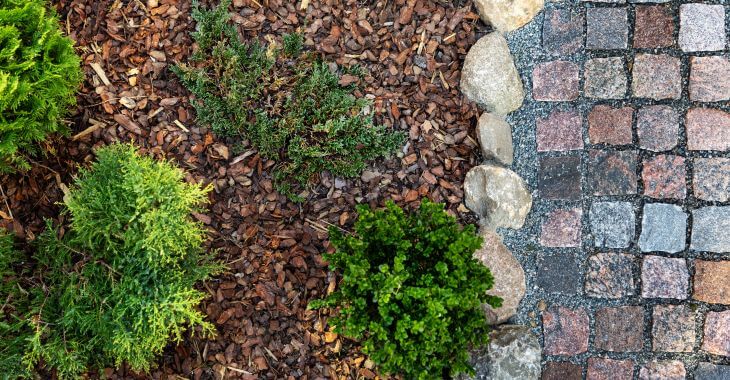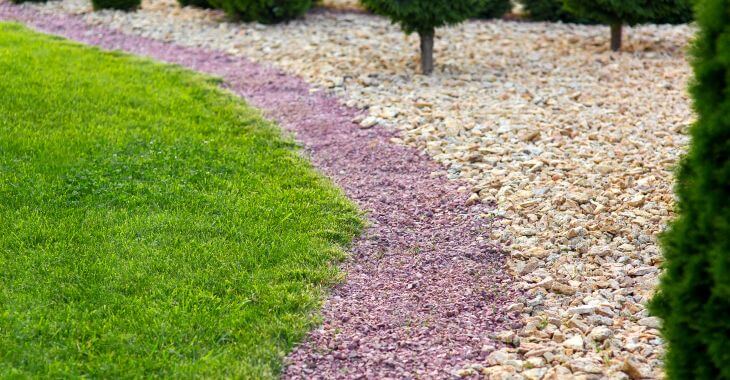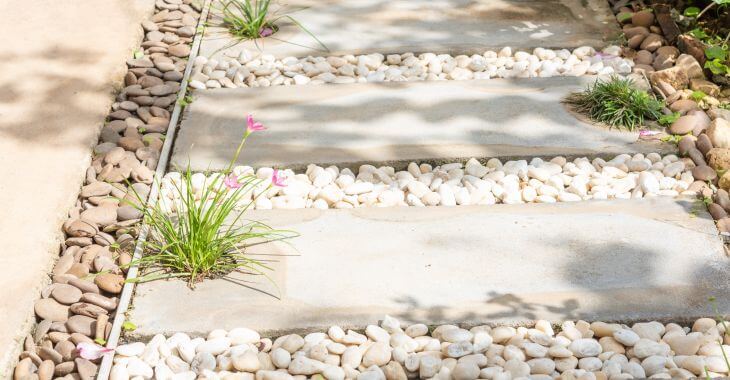Comparing Mulch vs. Rock for Landscaping

Landscaping plays a crucial role in enhancing the aesthetics and functionality of outdoor spaces. When choosing materials for your landscape beds, two common options are mulch and rocks. Both have their advantages – this article compares mulch vs. rock for use in landscaping.
Mulch for Landscaping
Mulch is a popular choice for many landscaping projects due to its versatility and range of benefits. It is typically made from organic materials such as wood chips, bark, leaves, straw, or compost, although synthetic options are also available. Some pros and cons of mulch include:
- Moisture Retention: One of the primary benefits of mulch is its ability to retain moisture. It acts as a barrier that slows down evaporation from the soil, helping keep the plants’ root zone consistently moist. This can be especially advantageous in hot and dry climates.
- Weed Suppression: Mulch forms a protective layer that inhibits the growth of weeds by blocking sunlight. This reduces the need for manual weeding and herbicides, making it an eco-friendly option.
- Soil Temperature Regulation: Mulch helps regulate soil temperature by insulating the soil. In cold weather, it keeps the soil warmer, while in hot weather, it keeps the soil cooler. This can promote healthier root development for plants.
- Improved Soil Structure: As mulch breaks down over time, it enriches the soil by adding organic matter and nutrients. This can enhance soil fertility and improve plant growth.
- Aesthetic Appeal: Mulch comes in various colors and textures, allowing you to choose a style that complements your landscape design. It provides a polished and cohesive look to your garden beds.
- Decomposition: Organic mulch materials will decompose over time and need replenishing. This ongoing maintenance may be required every year or two, depending on the type of mulch used.
- Cost: While mulch is generally affordable, the cost can add up over time due to the need for replenishment. High-quality mulch products may come at a slightly higher price point. This may be a factor when considering rock vs. mulch landscaping.
- Flammability: Some mulch materials, such as wood chips, can be flammable. It’s essential to consider fire safety when using mulch, especially in areas prone to wildfires.
All these factors can impact whether you should use rock vs. mulch for your landscaped spaces.
Rocks for Landscaping
Landscaping with rocks, or rockscaping, involves using various types and sizes of stones, pebbles, gravel, or boulders to create decorative and functional elements in your outdoor space. Here are some key points to consider when using rocks instead of mulch in your landscaping:
- Durability: Rocks are exceptionally durable and can withstand various weather conditions, including extreme heat, cold, and heavy rain. They have a long lifespan and require minimal maintenance.
- Low Maintenance: Once rocks are in place, little to no maintenance is required. You won’t need to replace or replenish them regularly as you would with mulch.
- Weed Prevention: Like mulch, rocks can also help suppress weeds by blocking sunlight. They create a barrier that prevents weed growth between and around rocks.
- Erosion Control: Rocks can be strategically placed to help prevent soil erosion, particularly on slopes or areas prone to runoff.
- Distinctive Aesthetic: Rocks can lend your landscape a natural and rugged look. They come in various colors and textures, allowing for creative and unique design possibilities.
- Heat Retention: Rocks can absorb and retain heat, which may not be ideal for plants in hot climates. They can create a microclimate that raises soil temperatures, potentially stressing plants.
- Weight and Transport: Rocks are heavy, and transporting and arranging them can be labor-intensive. Professional installation may be necessary for large-scale rockscaping projects.
- Cost Variability: The cost of rocks can vary widely depending on the type, size, and availability of stones. Exotic or rare rocks can be expensive, while local or common varieties may be more affordable.
- Limited Soil Improvement: Unlike mulch, rocks do not enrich the soil as they do not decompose. You may need to consider soil improvement separately if you choose rocks for your landscaping.
When to Use Mulch vs. Rocks
The choice between mulch and rocks for landscaping depends on various factors, including your aesthetic preferences, maintenance capabilities, climate, and the specific needs of your plants and garden beds. There are some scenarios where each option may be more suitable.
Use Mulch When:
- You have plants that prefer consistently moist soil, such as many flowering annuals and vegetables.
- You want to improve the soil structure over time by adding organic matter.
- You prefer a softer and more natural look for your garden beds.
- You have the time and willingness to perform regular maintenance, such as mulch replenishment and weeding.
Use Rocks When:
- You have plants that thrive in well-drained soil, like succulents and cacti.
- You prefer a low-maintenance and long-lasting solution for your landscape.
- You want to create a distinct and modern aesthetic, especially in arid or desert-themed landscapes.
- You live in an area with fire restrictions, and fire-resistant landscaping is a priority.
- You’re looking for a way to control erosion on slopes or along pathways.
Sometimes, you may combine mulch and rocks in your landscaping designs. This combination allows you to enjoy the benefits of both materials. This approach offers versatility and customization in your landscaping design.

Choosing rock vs. mulch landscaping ultimately depends on your specific needs and preferences – it can be beneficial to discuss the best option for your yard with a professional landscaper to create a well-designed landscape that can enhance the beauty and functionality of your outdoor space.

